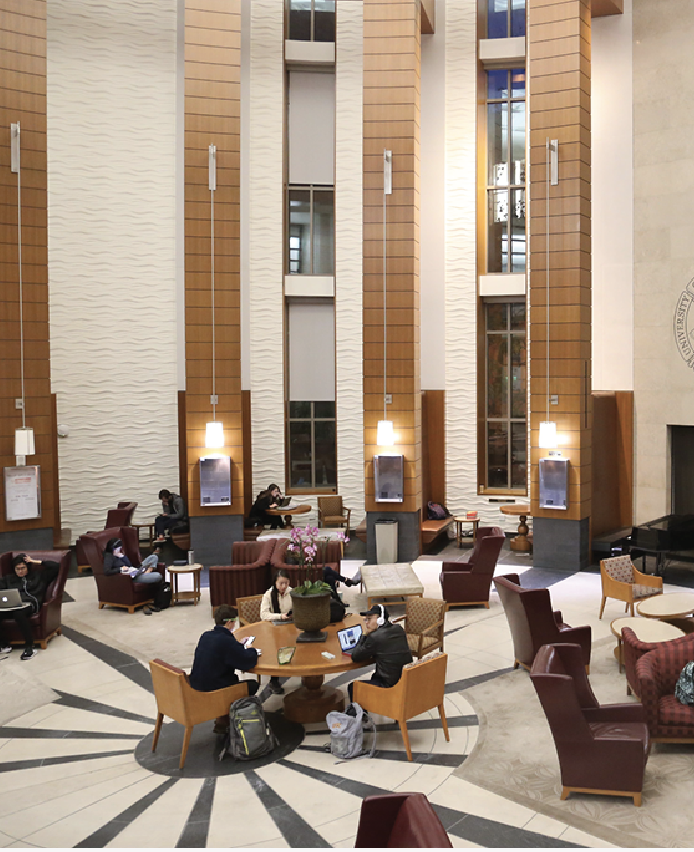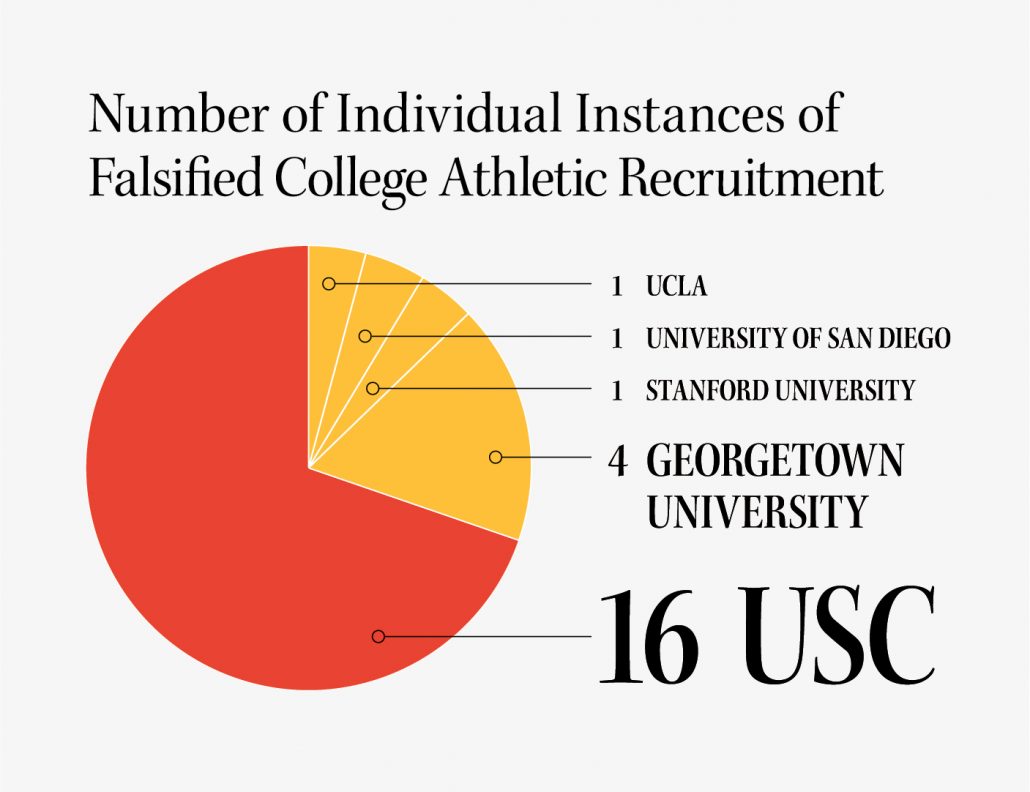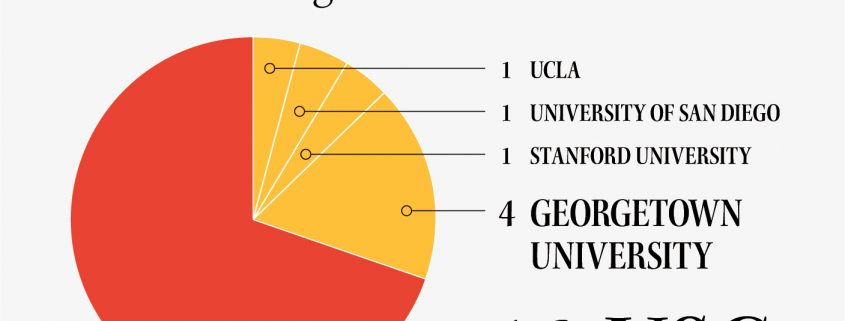USC at forefront of national college admissions scandal

Freshman Tahrima Bhuiyan wasn’t surprised when she first learned about the national college admissions scandal from a segment on “The Daily Show.”
“We have Harvard, Yale-level students who are making Harvard, Yale-level stats [at my high school] — even I was,” Bhuiyan said. “When we all got our rejections, I was like, “There has to be something rigged about this.’”
On March 12, the FBI disclosed from its investigation that 50 celebrities, executives, lawyers and professors had paid millions of dollars to change their children’s standardized test scores, bribe university officials and coaches and create fake athletic profiles to earn their children admission to USC, UCLA, Yale and Stanford, among other colleges.
According to court records, 24 students were allegedly admitted to USC under the guise of athletic recruitment between 2011 and 2019, the most of any university implicated in the investigation.

After meeting a number of wealthy legacy students in her first year at USC, Bhuiyan questioned how many of them were admitted based on personal merit.
“It’s who you know, knowing someone on the admissions board or having those connections can help you get in, but there’s so much else,” Bhuiyan said. “If a low-income student who is first-generation … doesn’t have those connections, they would be at a disadvantage.”
So far, USC administrators have taken preliminary measures to address the issue, including terminating senior associate athletics director Donna Heinel and water polo coach Jovan Vavic — two key players in the alleged athletics bribery scandal — on March 12. USC is the only university with a senior athletics official indicted in the case.
Heinel and Vavic, along with former women’s soccer coaches Ali Khosroshahin and Laura Janke, were indicted Tuesday for their involvement in the case.
“We understand that the government believes that illegal activity was carried out by individuals who went to great lengths to conceal their actions from the university,” USC wrote in a statement. “USC is conducting an internal investigation. Donna Heinel and Jovan Vavic have been terminated, and the University will take additional employment actions as appropriate.”
In a briefing, U.S. attorney Andrew Lelling called the investigation, code-named “Operation Varsity Blues,” the “largest college admissions scam ever prosecuted by the Department of Justice.”
According to court records, The Edge College & Career Network, a for-profit college counseling business founded by William “Rick” Singer, is accused of running the student-athlete recruitment scam. Parents across all eight universities named in the charges allegedly paid Singer nearly $25 million to admit students to universities through bribery and posing as athletic recruits.
Charged with money laundering, obstruction, racketeering and conspiracy to defraud the United States, Singer — who came to serve as a cooperating witness in the FBI investigation last September — pleaded guilty March 12.
To earn students admission to USC, Singer allegedly bribed the four USC Athletics staffers. The scam allegedly involved forging information on applications to allow certain applicants to be admitted as athletic recruits, despite having no experience and not playing once recruited.
“On multiple occasions between 2014 and 2018, Singer’s clients made payments of more than $1.3 million to USC accounts controlled by Heinel, typically an account for the USC Women’s Athletic Board,” court records said. “Singer also entered into a sham consulting agreement with Heinel … in exchange for the bribe payments Heinel helped facilitate the admission of more than two dozen students as recruited athletes.”
The court records allege that Singer directed payments totaling $350,000 to a private soccer club owned by Janke and Khosroshahin, which was used to support the profiles of those admitted through the USC women’s soccer team, even though they never played. Similar payments were allegedly made to grant students admission to the USC water polo team, though they never participated.
“The board, all of us, are obviously very disappointed in what happened,” Board of Trustees Chairman Rick Caruso said. “It is incredibly unthinkable in my opinion, of what these parents did with these administrators and these coaches.”
More than two dozen students were admitted to USC under false student-athlete pretenses, the court records allege. Fifty executives and actresses have been named in the indictment for alleged involvement in false athletic recruitment for sports including men’s water polo, women’s soccer, women’s lacrosse and football. Several applicants involved in exam cheating reportedly received extra time on standardized tests like the SAT and ACT.
Homayoun Zadeh, a professor at the Ostrow School of Dentistry, was placed on leave after being named in the federal indictment. According to the charging documents, Zadeh allegedly plotted to bribe former senior associate athletics director Donna Heinel to admit his daughter as a lacrosse recruit, though she never played the sport.
Additionally, the forty were indicted for college entrance exam cheating. Several applicants involved in exam cheating reportedly received extra time on exams.
Entrepreneur Peter Jan Sartorio’s daughter, who applied to USC, received a score of 27 out of 36 on her ACT, which placed her in the 86th percentile — after she was allegedly provided with extra time. Previously, she had scored 900 on her PSAT, which placed her between the 42nd and 51st percentile, according to the court records. In one instance, Heinel, Janke and Singer allegedly agreed to recruit an applicant to the USC women’s crew team in September 2016. The court records state that Singer sent photos of the a student in a boat; however, according to the court records, the actual applicant was the one in the pictures.
The next month, the USC athletic admissions subcommittee granted the applicant conditional acceptance to USC on the condition that she meet the NCAA eligibility requirements, the court records read.
William McGlashan, a founding partner of investment firm TPG Growth, has also been accused of participating in the admissions scheme in order to grant his son admission to USC, court records read.
According to the court records, McGlashan’s son sought admission to the Iovine and Young Academy. In response, Singer allegedly created a fake football profile that labeled McGlashan’s son as a kicker and punter, though his high school did not have a football team.
To make the profile, Singer allegedly said he would modify photos so that McGlashan’s son would be portrayed as a kicker. In a phone conversation, Singer also allegedly said that Heinel gave him instructions on how to make the profile. McGlashan was also instructed to make donations totaling to $250,000 to women’s athletics, according to phone transcripts in the court records.
In the phone conversation, McGlashan also allegedly discussed how to keep these means of admission secret from his son.
“I would tell him, ‘Listen, I got lots of friends in athletics,’” Singer said, according to the phone transcript. “‘You’re an athlete kind of guy, and my friends in athletics are going to help you … They’re going to help you get in. Because they have the easiest way in.’”
Once Singer agreed to cooperate with the government’s investigation last September, the court records allege he warned McGlashan and other clients about the investigation. Singer later agreed to an additional charge of obstruction of justice when he continued to cooperate with the FBI.
“Fuller House” actress Lori Loughlin and her husband, fashion designer Mossimo Giannulli, as well as resort executive Gamal Abdelaziz and investment firm CEO Robert Zangrillo are also among those accused of allegedly bribing USC athletic department officials and creating fake athletic profiles to earn their children admission to the University.
“Fuller House” actress Lori Loughlin and fashion designer Mossimo Giannulli allegedly paid to have women’s crew athletic profiles created for both their daughters, Olivia Jade, a social media influencer with over 1.4 million followers on Instagram, and Isabella Giannulli. The two currently attend USC. According to court records, neither daughter has experience rowing nor currently rows for the University.
At the time of publication, the University confirmed that Olivia and Isabella are both still enrolled at USC, but their status has been put on hold.
Isabella is a sophomore majoring in communication. According to a statement released by the Annenberg School for Communication and Journalism public relations and journalism faculty, the alleged scam is a “gross lapse of governance and accountability” and is causing students distress.
“Transparency, honesty and accountability are at the core of the journalism and public relations professions,” the faculty statement read. “For that reason, we believe we have a moral and intellectual obligation to speak out and demand that USC uphold these values.”
The statement, backed by a unanimous vote of journalism and public relations faculty during a meeting on Monday, pledges to investigate the University’s admissions systems through a series of joint faculty-student projects.
Alejandro Lomeli, a freshman majoring in chemical engineering, said that the news of wealthy families scamming the admissions system is unfair to students who overcome obstacles and low income backgrounds to attend college.
As a Latinx student who attended a low-performing high school, Lomeli said that college counselors often told him to not expect much when applying to selective universities like USC. But when he and other minority applicants did get into prestigious colleges, he said they were told they were admitted through affirmative action and took spots away from more qualified students.
Lomeli said he was the only student in his year to be admitted to USC from his high school. While he is grateful to attend USC and receive the financial support he needs, Lomeli thinks schools like USC need to make more of an effort to accept students from lower income backgrounds, who lack access to resources.
“I would have loved to see USC admit more students from backgrounds like mine, who still work hard despite having disadvantages that other demographics are fortunate with not having to deal with,” he said.
In a March 12 email to the USC community, Interim President Wanda Austin stated that USC is a “victim” in this case. She wrote that the alleged bribery was mainly perpetrated by the now-terminated staff named in the case.
Austin wrote that the University is taking “significant remedial actions,” including reviewing admission decisions, identifying any funds that could be connected to the allegations, implementing new processes and training to prevent future bribery cases.
In addition to terminating Heinel and Vavic, Austin announced in a memo to the USC community March 14 that the University has launched an internal investigation into the scheme. The University also began identifying donations that were made in connection with the scam and will look to redirect the funds to create scholarships for underserved students, according to the memo.
Austin announced that USC has rescinded and denied admission to applicants who are connected to the allegations in the 2019 application cycle.
The University also announced Monday that students linked to the admissions scheme were informed of a hold placed onto their accounts, preventing them from registering for classes or acquiring their transcripts until their cases are reviewed. After reviewing each application, USC wrote that it will take “proper action” for each student, possibly including expulsion.
“We will make informed decisions about those cases as the reviews are completed,” Austin wrote. “USC’s Office of Professionalism and Ethics, Student Affairs and Admissions and Enrollments are conferring on this process to ensure the University follows the appropriate course.”
Caruso said Austin’s presidency has been bringing USC’s culture toward one of accountability and transparency.
“It is very difficult to eliminate or completely prevent isolated incidents from happening, especially when you have 40,000 employees,” Caruso said. “The meaningful test is to take all the action you can to prevent all the bad things from happening. But then you also have to react appropriate and swiftly.”
Caruso praised Austin for firing Heinel and Vavic and for sending a “strong” message to the community.
“It is a clear demonstration on Austin’s part that there is a new day at ’SC in terms of accountability, a new day in terms of culture, and we’re moving upward and forward,” Caruso said. “We will not tolerate any kind of bad act that impacts the integrity of students and this University.”
Board member John Mork said recent press coverage has made the University seem corrupt, but he believes the administration has taken all the necessary steps to begin the remediation process. Mork said he agrees that USC was a victim in the alleged scam.
“It will hurt our reputation to some extent,” Mork said. “They scammed people, and the victimhood is going to go on because it’s misreported in the press, and they would have you believe that the entire athletic department and the entire admissions department is somehow fouled up, and that’s not right at all.”
Undergraduate Student Government president-elect Trenton Stone said that he and vice president-elect Mahin Tahsin have scheduled meetings with administrators in the next few days and will attend a Board of Trustees retreat, where they will discuss student perspectives on the admissions scandal with University officials and the steps USC can take moving forward. They said that in the coming days, USG will discuss what role their leaders can play in the remediation process.
Stone said as they transition into their new leadership roles and welcome new University leaders next semester, he and Tahsin have the responsibilities in making sure that the new president and other officials understand how past scandals have impacted students’ relationship with and views of the University.
“A lot of people are upset with USC, and they’re right to do that,” Stone said. “There’s issues that are happening, and the only way to renew that trust is with this new leadership coming in to be able to show their full commitment to the student … and that they’re willing to make the necessary changes.”
By talking with University officials and administrators, Tahsin said student leaders can make sure that student voices are taken into account for campus changes moving forward.
“A lot of that representation for students comes with student leadership being involved in these committees and these departments that are trying to shift away from the culture that has existed,” Tahsin said. “I think that is the best way that students can firsthand impact the change that’ll form USC for years to come.”
Stone also said it’s important for USG, Graduate Student Government, Academic Senate, Faculty Senate and other governmental bodies to work together in the future to push for change in issues, such as the lack of transparency in administrative actions.
Rich Szabo, a parent of two USC freshmen, said people were not familiar with the University in St. Louis. But since the alleged college admissions scandal has captured national headlines, Szabo said friends have asked him if he had paid for his kids to gain admission to USC.
“It never really had any kind of name recognition, now it has probably a bad recognition,” Szabo said. “At least here, nobody had heard of any of the other scandals that had gone on in the past few years, but people have now heard of this one mainly because of the Hollywood connection.”
Szabo said he worries that this negative reputation could hurt the value of his children’s degrees once they graduate.
Junior Ryan Rogers, who is majoring in business administration, said that the University seems to be more elite and sought after if high-ranking families are willing to pay hefty costs to reserve a space for their children.
“People wouldn’t spend $500,000 to send their kid to a school that was not good and not highly regarded and not the best of the best,” Rogers said. “The kids who have earned their way here and have worked hard to get here should feel all the more satisfied that they’ve actually earned it.”
Ted Kaiser, who graduated from USC in 2005, donates $3,000 to USC Athletics each year as a member of the Cardinal and Gold program. He also purchases football season tickets and regularly makes donations to the Marshall School of Business.
Kaiser considered stopping his annual donation to the University following Austin’s controversial announcement to terminate Marshall Dean James Ellis following this academic year. According to Kaiser, some of his friends have halted their donations and chosen not to purchase season tickets for this upcoming season.
Kaiser said that a few days before the college admissions scandal made national headlines, he decided to make his donation for the next academic year. But Kaiser said if he doesn’t see substantial changes in leadership soon, he may eventually pull his funding.
“Frankly, it’s kind of appalling to me that [Austin] tries to play USC and the administration as a victim in this case, when to me, it goes more to the fact that the overall leadership has not been nonexistent both at the athletic department and the University as a whole, which is why you continue to have scandal after scandal,” Kaiser said.
Dean Hallett, an alumnus who donates $30,000 each year on top of other gifts to the Marshall School of Business and USC Athletics, said he will continue with his current donations despite the controversies surrounding the University. Still, he also looks forward to a new USC president who will help the University rebuild its culture and reputation.
“The Trojan blood in me runs so deep, I don’t think it changes how I feel about the University as an institution,” Hallett said. “It certainly changes my view of the current administration at the University.”

